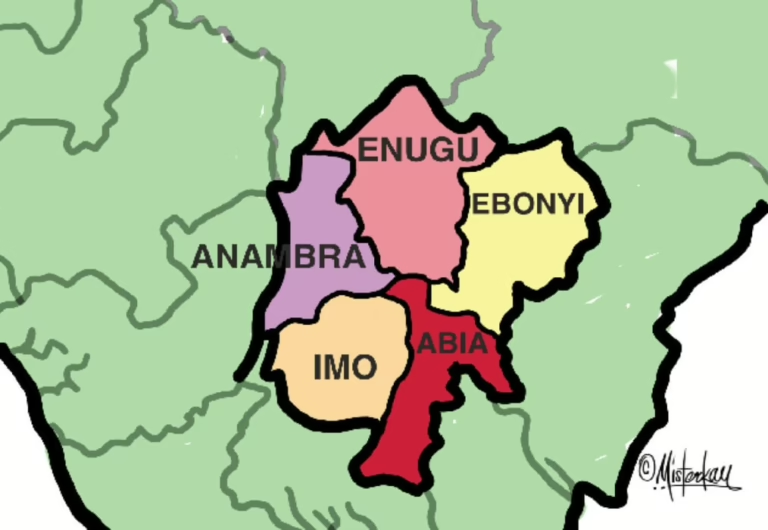As this six-week in-depth review of the 2025 Phillips Consulting State Performance Index (pSPI) concludes, focus now shifts to the South East region. Long celebrated as Nigeria’s commercial heartbeat, this area has been synonymous with innovation and tenacity. Its bustling markets-from Onitsha to Aba-have long been hubs of entrepreneurial vigor, while its diaspora has significantly influenced the country’s professional and industrial landscapes. However, the latest pSPI results paint a more sobering picture: Abia ranks 10th, Ebonyi 13th, Enugu 20th, Imo 31st, and Anambra 34th. Once regarded as Nigeria’s manufacturing powerhouse, the South East now grapples with middling to poor governance outcomes.
The South East’s current situation echoes the fate of Renaissance Italy’s city-states such as Florence, Venice, and Milan. These centers once dazzled with commerce, art, and intellectual achievements but eventually faltered due to political disunity and lack of strategic vision. Despite abundant wealth and energy, fragmented governance left them vulnerable as Atlantic economies surged ahead. Today, the South East faces a similar challenge: a wealth of entrepreneurial spirit undermined by institutional fragility and political disarray.
Abia and Ebonyi: Emerging Beacons
Within the South East, Abia shines as a beacon of hope. Positioned 10th, it has capitalized on Aba’s commercial vitality to outpace its neighbors. The Ariaria market, often dubbed the “Silicon Valley of African trade,” is gradually transitioning from informality through initiatives like electrification, modest credit facilities, and incremental infrastructure improvements. While these efforts are not revolutionary, they mark progress toward formalizing the economy. This tangible momentum resonates with residents, reflected in Abia’s relatively strong perception scores. Abia today resembles the pragmatic Dutch provinces of the 1600s-small-scale, commercially driven, and thriving through discipline rather than grandeur.
Ebonyi, ranked 13th, has defied expectations. Once considered the region’s underdog, it has invested in road construction, boosted agricultural productivity, and expanded access to essential services. Its uneven but steady development mirrors the early Prussian states before German unification: focused on infrastructure and order but still lacking the comprehensive intellectual and economic framework to compete fully. Ebonyi’s next challenge is to shift from physical infrastructure to strengthening institutions and human capital, lest its progress remain superficial rather than transformative.
Nonetheless, both states confront a critical hurdle: their advancements occur in isolation without a cohesive regional strategy to magnify their strengths. Much like the Dutch trading cities that flourished independently but lacked the territorial unity of emerging nation-states, Abia and Ebonyi’s achievements risk fragility without integration into a broader South East development agenda.
Enugu: A City Clinging to Its Past
Enugu’s 20th-place standing reflects a state resting heavily on its historical laurels. Once the capital of Eastern Nigeria and a symbol of modernity, the “coal city” boasted thriving universities, a professional civil service, and well-planned infrastructure. Today, much of that prestige has faded. Governance appears cautious, infrastructure projects lack strategic coherence, and public sentiment is lukewarm. Enugu’s current state is reminiscent of Vienna after the Austro-Hungarian Empire’s dissolution-cultured and elegant but struggling to redefine its role in a transformed political and economic landscape.
Rail lines that once connected Enugu to the broader region now lie neglected. Coal, once the economic backbone, has been eclipsed by oil in other regions, with no equivalent industry to fill the void. Political leaders cling to Enugu’s symbolic status but have yet to chart a bold new path forward. History offers a cautionary tale: Toledo in Spain, once the imperial capital, declined into obscurity as Madrid rose. Enugu faces a similar risk unless it reinvents itself through emerging sectors like knowledge-based industries, renewable energy, or enhanced regional trade integration.
Imo and Anambra: Struggling Amidst Potential
At the lower end of the spectrum, Imo and Anambra reveal deeper systemic issues within the South East. Imo, ranked 31st, should be a regional frontrunner given its oil wealth and dynamic population. Yet, inconsistent governance, political instability, and weak institutions hamper progress. Grand openings often replace sustainable development, and public frustration is palpable. Imo’s predicament is akin to the waning Habsburg Empire-ceremonially grand but administratively hollow.
Anambra’s situation is even more troubling. Once hailed as the entrepreneurial core of the South East, home to Nnewi’s industrial hubs and Onitsha’s expansive markets, it now languishes at 34th place. The disconnect between political rhetoric and actual governance is stark. Infrastructure crumbles, healthcare services falter, and public confidence erodes. This mirrors the late Roman Republic, where eloquent debates masked widespread corruption and decay. Anambra’s entrepreneurs continue to succeed despite governance failures, a precarious model that cannot endure indefinitely.
Both states exemplify how unfulfilled potential can become a liability. Like Athens after the Peloponnesian War, brilliance without disciplined governance ultimately collapses under its own contradictions.
The Challenge of Political Disunity
The South East’s most significant obstacle is its political fragmentation. Unlike the South West, which experiments with regional collaboration, the South East remains divided, with each state pursuing isolated projects and leaving regional infrastructure ambitions unrealized. The vision of an economic corridor linking Aba, Onitsha, Enugu, and Nnewi remains aspirational rather than operational. Without scale and coordination, the region cannot convert its entrepreneurial energy into meaningful industrial transformation.
The historical parallel is instructive. Italian city-states, despite their cultural and commercial brilliance, failed to unite as global trade shifted westward. Genoa, Florence, and Venice became cultural icons but economic backwaters compared to rising powers like Spain, Portugal, and Britain. The South East risks a similar fate: admired for its enterprise but sidelined in Nigeria’s broader economy if it cannot foster cooperation.
The pSPI’s combined analysis of quantitative data and citizen sentiment highlights this fragmentation starkly. Even where spending occurs, citizens feel disconnected. When schools lack teachers, hospitals run out of medicines, and roads deteriorate shortly after completion, public perception plummets. Governance is ultimately judged by lived experience, not budget figures. The South East cannot afford to overlook this reality.
What the region needs are leaders who view governance as stewardship rather than patronage. Prioritizing essential services-education, healthcare, urban management-will rebuild public trust. Embracing regional planning for transportation, energy, and industrial zones, alongside institutional discipline that transcends electoral cycles, is crucial.
Between Opportunity and Risk
The South East stands at a pivotal juncture. Abia and Ebonyi offer glimpses of hope, while Enugu drifts and Imo and Anambra decline. The region’s entrepreneurial spirit is formidable; its diaspora networks provide vital capital and expertise; its people remain industrious. Yet, these strengths are undermined by weak governance and a lack of regional cohesion.
If leaders commit to transparency, discipline, and collaboration, the South East can reclaim its status as Nigeria’s industrial heartland-integrating markets with ports, revitalizing industries, and leveraging its rich cultural heritage. Without such resolve, it risks becoming a cautionary example-a region remembered more for its unrealized potential than its achievements. History seldom favors those who ignore such warnings.






















